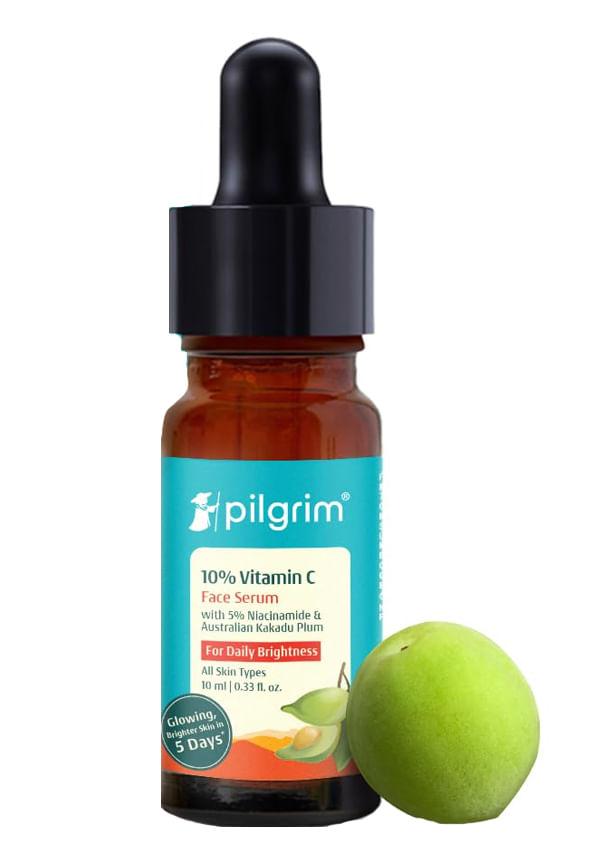How To Make DIY Vitamin C Serum For Glowing, Youthful Skin


 10 ml
10 ml10% Vitamin C Face Serum with Vitamin C, 5% Niacinamide & Hyaluronic Acid
Skincare enthusiasts swear by vitamin C for its ability to brighten skin, fight signs of ageing, and restore a natural glow. While store-bought serums can be pricey, making your own is simple, cost-effective, and ensures you know exactly what’s going on your skin.
In this guide, you’ll discover the benefits of vitamin C for your skin, step-by-step DIY serum recipes for different skin types, and tips for storing and combining vitamin C with other ingredients.
Vitamin C is a powerhouse ingredient for skincare, with results that can transform your complexion over time. Here’s how it works wonders for your skin:
Brightens Skin Tone
Vitamin C reduces dark spots, hyperpigmentation, and dullness by blocking excess melanin production. The result? A more even, glowing complexion that looks radiant every day.
Fights Signs of Ageing
As we age, collagen—the protein that keeps skin firm and plump—starts to decline. Vitamin C stimulates collagen production, smoothing fine lines and wrinkles for a youthful appearance.
Shields Against Environmental Damage
As a powerful antioxidant, vitamin C defends your skin against free radicals caused by pollution, UV exposure, and stress. It acts like a protective barrier to keep your skin healthy and resilient.
Smooths and Softens Skin
By gently exfoliating dead skin cells and supporting cell turnover, vitamin C leaves your skin feeling soft and silky while improving its texture over time.
Making a vitamin C serum at home is surprisingly easy, and the best part? You can tweak the recipe to suit your skin type. Let’s dive into some tried-and-true formulations:
This beginner-friendly recipe is perfect for anyone new to DIY skincare.
Ingredients:
1 teaspoon L-ascorbic acid (pure vitamin C powder)
1 tablespoon distilled water
1 teaspoon vegetable glycerine (optional for hydration)
Instructions:
In a small bowl, dissolve the vitamin C powder in distilled water.
Add vegetable glycerine if your skin feels dry or tight.
Pour the mixture into an amber glass bottle to protect it from light.
This light, hydrating serum is suitable for daily use and provides a gentle introduction to vitamin C’s benefits.
 30 ml
30 ml10% Vitamin C Face Serum For Bright, Glowing Skin
If you struggle with breakouts or excess oil, this serum will leave your skin feeling balanced and refreshed.
Ingredients:
1 teaspoon L-ascorbic acid
1 tablespoon aloe vera gel
2-3 drops tea tree essential oil
Instructions:
Mix the vitamin C powder with aloe vera gel until it’s fully dissolved.
Add tea tree essential oil, known for its antibacterial properties.
Transfer to a dark bottle and refrigerate.
This soothing serum reduces redness, fights acne-causing bacteria, and hydrates without clogging pores.
This rich, nourishing serum is ideal for dry or ageing skin, delivering hydration while boosting elasticity.
Ingredients:
1 teaspoon L-ascorbic acid
1 tablespoon rose water
1 teaspoon jojoba oil or sweet almond oil
Instructions:
Dissolve the vitamin C powder in rose water, known for its calming properties.
Stir in the jojoba or almond oil for added moisture and nourishment.
Store in a cool, dark place to preserve its potency.
This serum deeply hydrates, smooths fine lines, and leaves your skin with a soft, dewy glow.
Vitamin C is highly effective but notoriously unstable. To keep your serum potent:
 10 ml
10 ml10% Vitamin C Face Serum For Daily Brightness
Use an Amber Glass Bottle: Dark bottles block light, which can degrade vitamin C.
Refrigerate It: Cool temperatures slow down oxidation and extend the serum’s shelf life.
Make Small Batches: Homemade vitamin C serum has a short shelf life (1-2 weeks), so avoid making more than you can use.
Watch for Colour Changes: If your serum turns yellow or brown, it’s oxidised and less effective. Discard and make a fresh batch.
Enhance your DIY serum’s effectiveness by pairing vitamin C with complementary ingredients:
Hyaluronic Acid
Locks in moisture, plumps the skin, and enhances hydration. Perfect for dry or dehydrated skin.
Vitamin E
This antioxidant works in tandem with vitamin C to amplify its protective and anti-ageing benefits.
Niacinamide
Balances oil production, soothes redness, and minimises pores. Use in your skincare routine but avoid mixing directly with vitamin C for maximum effectiveness.
Aloe Vera
Provides calming and hydrating properties, making it a great addition for sensitive skin.
If DIY isn’t your thing, or if you’re short on time and prefer ready-made options, here are some tried-and-tested vitamin C serums to consider:
 30 ml
30 mlRetinol Vitamin C Face Serum
Do a Patch Test: Before applying to your face, test the serum on a small area to ensure it doesn’t cause irritation.
Apply in the Morning: Vitamin C protects your skin from environmental damage, so it’s best used during the day.
Follow with SPF: Vitamin C increases your skin’s sensitivity to sunlight, so pair it with sunscreen for optimal protection.
Start Slowly: If you’re new to vitamin C, apply it every other day and gradually increase frequency as your skin adjusts.
Yes, but always do a patch test first. Start with a lower concentration of vitamin C to avoid irritation and gradually increase as your skin adjusts.
For beginners, start with every other day. Once your skin adapts, you can use it daily, preferably in the morning, followed by sunscreen.
Yes, vitamin C pairs well with hyaluronic acid and vitamin E. Avoid using it with niacinamide or retinol in the same routine to prevent irritation.
Making your own vitamin C serum is a fantastic way to embrace natural skincare while saving money. By choosing ingredients that suit your skin’s specific needs, you’ll create a powerful serum that brightens, protects, and rejuvenates your complexion.
Whether you’re fighting fine lines, battling acne, or simply looking for a radiant glow, DIY vitamin C serum is the ultimate natural skin-brightening remedy. Try one of these recipes today, and let your skin shine like never before!